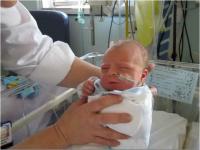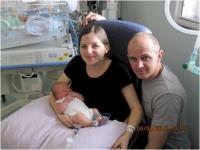9th April 2010
 Riley Joyce, who
became the first newborn in the world to receive xenon gas to try
and prevent brain injury.St Michaels Hospital, part
of University Hospitals Bristol NHS Foundation Trust, has become
the first hospital in the world to successfully deliver xenon gas
to a newborn baby in a bid to prevent brain injury following a lack
of oxygen at birth.
Riley Joyce, who
became the first newborn in the world to receive xenon gas to try
and prevent brain injury.St Michaels Hospital, part
of University Hospitals Bristol NHS Foundation Trust, has become
the first hospital in the world to successfully deliver xenon gas
to a newborn baby in a bid to prevent brain injury following a lack
of oxygen at birth.
This pioneering technique has been developed by Marianne
Thoresen, Professor of Neonatal Neuroscience at the University of
Bristol and Dr John Dingley, Consultant Anaesthetist and Reader in
Anaesthetics at Swansea Universitys School of Medicine. This study
is being funded by Sparks, the childrens medical research
charity.
In the UK, every year, more than 1,000 otherwise healthy babies
born at full term die or suffer brain injury caused by a lack of
oxygen and/or blood supply at birth. This can lead to lifelong
problems such as cerebral palsy.
St Michaels Hospital and the University of Bristol has pioneered
new treatments for brain injury in babies since Marianne Thoresen
first started cooling babies in 1998, showing that cooling babies
after a lack of oxygen could reduce damage in the newborn brain.
After her original laboratory work from 1995 showing that cooling
after lack of oxygen reduced brain injury in animal models,
clinical trials of cooling have now proven that mild cooling by
only a few degrees for 72 hours is a safe and beneficial treatment.
However, cooling only partially reduces disability and does not
prevent it in all babies. The search has been to find a second
treatment that could be added to further reduce disability.
Professor Marianne Thoresen, says:
Xenon is a very rare and chemically inert anaesthetic gas found
in tiny quantities in the air that we breathe. In 2002 John Dingley
and I realised the potential xenon and cooling might have in
combination to further reduce disability. Over the past eight
years, we have shown in the laboratory that xenon doubles the
protective effect of cooling on the brain; however we faced the
challenge of how to safely and effectively deliver this rare and
extremely expensive gas to newborn babies.
 Baby Riley with
parents Sarah and Dave Joyce.Dr Dingley has been
developing equipment in Swansea for xenon anaesthesia in adults for
over 10 years and has invented a machine to successfully deliver
the gas to babies. His machine takes the exhaled gas, removes any
waste products from it and re-circulates it to be breathed again
without any loss at all to the outside air. Some types of
specialist military diving equipment work in this way but it is
very unusual to build a system small enough to work reliably in
newborn babies.
Baby Riley with
parents Sarah and Dave Joyce.Dr Dingley has been
developing equipment in Swansea for xenon anaesthesia in adults for
over 10 years and has invented a machine to successfully deliver
the gas to babies. His machine takes the exhaled gas, removes any
waste products from it and re-circulates it to be breathed again
without any loss at all to the outside air. Some types of
specialist military diving equipment work in this way but it is
very unusual to build a system small enough to work reliably in
newborn babies.
Dr Dingley, says:
A key design feature of this machine is that it is very
efficient, using less than 200ml of xenon per hour - less than the
volume of a soft drinks can. Xenon is a precious and finite
resource and difficult to extract so it can cost up to £30 per
litre. As ventilated newborns breathe many litres of air per
minute, any xenon based treatment would be impossibly expensive
without an economical delivery method.
He continued: Despite these challenges, the lack of side-effects
and brain protecting properties of xenon make it uniquely
attractive as a potential treatment to apply alongside cooling in
these babies. We are very grateful to Sparks, the childrens medical
research charity, for supporting us in making this happen.
Following rigorous Medicines and Healthcare Regulatory Authority
approvals and other regulatory challenges, the device is now
authorised for clinical trials and will be used on at least 12
babies over the coming months. Successful completion of this
feasibility trial is the first required step before larger trials
on the effectiveness of the treatment can be undertaken in baby
units on a larger scale.
Professor Thoresen and Dr Dingleys previously successful
research work into cooling and the increased survival chances
offered by xenon have been funded through the childrens medical
research charity; Sparks, who has committed almost £800,000 to the
teams pioneering work. The charity has, over recent years,
committed almost £1.5m to cooling research, including the CoolCap
now being widely used in the NHS. Professor Thoresen was also
heavily involved in the pioneering CoolCap work.
Sparks president, England World Cup winning hero, Sir Geoff
Hurst MBE, recently visited the Bristol project and yesterday
commented: Congratulations to Professor Thoresen, Dr Dingley and
the rest of their dedicated team on this fantastic success. This
world first underscores the importance of the charitys funding and
makes every pound worthwhile. To me, personally, its even more
important than scoring the winning goal in a World Cup Final.